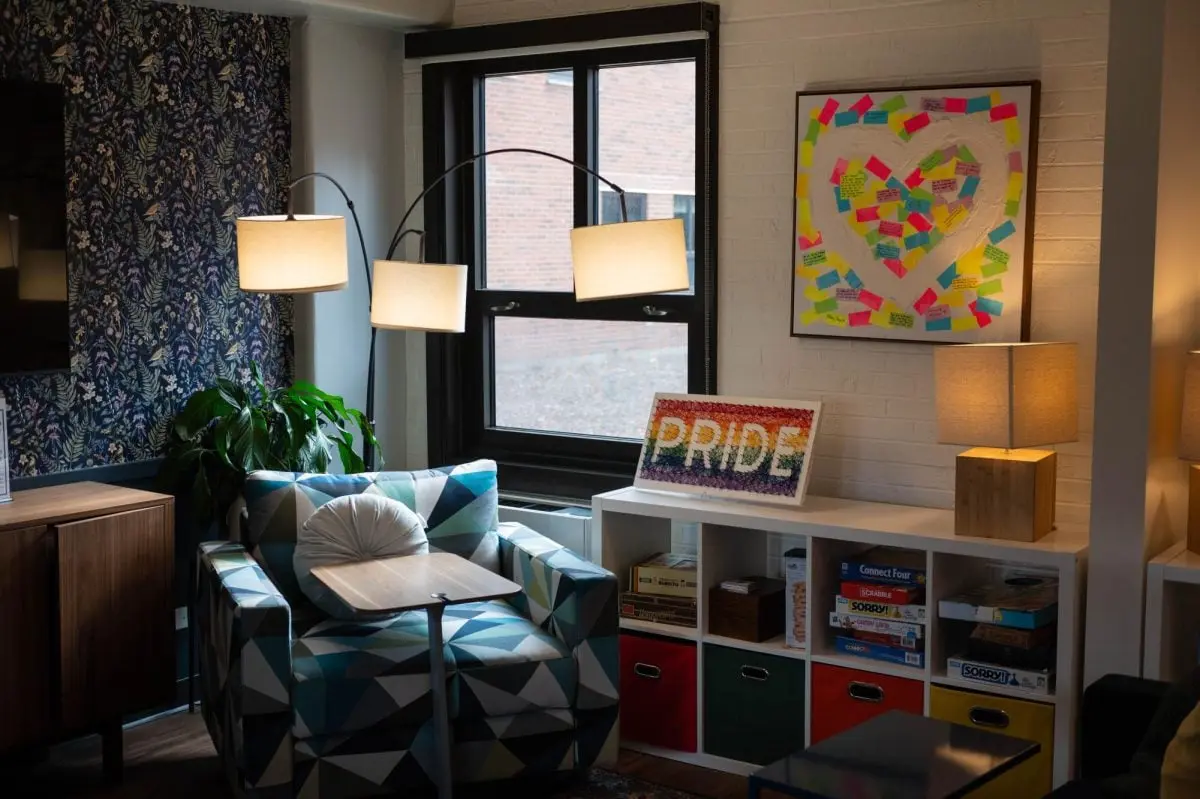When SESP sophomore Shepherd Williams heard Northwestern Residential Services would meet with members of LGBTQ+ organizations to discuss LGBTQ+ affinity housing, he believed the University was prepared to act.
Instead, five years after discussions to establish a Pride House began between student groups and Residential Services, the initiative still doesn’t have a clear timeline for implementation, leaving students confused about the path forward.
Calls to establish a Pride House intensified after the Associated Student Government passed a resolution supporting the initiative in May, and the Phi Mu Alpha Sinfonia fraternity house at 626 Emerson St. was vacated in June. In the resolution, advocates called for the Pride House to be established at 626 Emerson St. by Dec. 11, 2024.
But the University turned the empty building into a residence hall at the start of this academic year.
“The idea of the Pride House was created with a vested interest in improving living conditions for trans students on campus specifically,” Williams said. “As a trans student on campus, I recognize that living in dorms is difficult and transgender identity is more openly politicized, in terms of how we live our personal lives.”
Williams said the University puts transgender students at risk by assigning them gendered housing based on the gender they have on file, irrespective of their identity.
University spokesperson Amy Lee told The Daily that affinity “spaces” are not currently one of NU’s undergraduate housing models, but it is working with other institutions to explore how affinity housing communities can be successful.
On campus, students also have the option to be placed in all-, single- or mixed-gender housing. According to Lee, NU Residential Services considers both a student’s gender housing requirement — selected in the housing application — and their self-selected gender identity in the housing contract to assign them housing options that match their gender identity.
“Because other groups of students have expressed interest in a similar model, there is a need for a strategic approach that includes processes for developing and sustaining affinity communities,” Lee said.
NU currently has Hobart House, the Women’s Residential College; Sigma Alpha Iota, the women’s music fraternity; the GREEN House; and all-gender housing, but the University does not categorize these as affinity housing.
Weinberg senior and Rainbow Alliance External President Zoryah Gray said Residential Services has committed to another meeting with Pride House advocates this quarter.
According to Lee, Residential Services is currently creating a Student Housing Master Plan, which will consider new housing models as an option moving forward. The final report, which includes feedback from students, is expected to be released in early 2025.
Based on data from one of its quarterly Residential Experience Surveys, the University found that LGBTQ+ students had a “markedly high level of satisfaction and sense of belonging.” Residential Services presented this data to Pride House advocates during their meeting, Gray and Williams said.
“I don’t think that they used the data to undermine the legitimacy of the Pride House,” Gray said. “But from my point of view, the question they tried to raise with that was, ‘Is it necessary?’”
Lee said Residential Services did not present the data as a reason to question the necessity of the Pride House.
Residential Services plans to disaggregate the data on community satisfaction to understand variances in student responses, Lee added.
Gray said she has observed widespread support for the Pride House within NU’s LGBTQ+ student population, especially among transgender students.
“Student Affairs is committed to exploring the possibility of establishing Pride House and similar communities in a way that would ensure their sustainability and success, while creating spaces that allow students to build meaningful connections, foster a deeper sense of belonging and celebrate shared identities and interests,” Lee said.
Without a clear path forward to implement the Pride House, Gray said the University should commit to a concrete timeline for its establishment. She said the house would create a safe, welcoming space for LGBTQ+ students.
“Based on its principles, this is something the University should support,” Gray said.
Clarification: This story has been updated to better reflect the nature of the discussions to establish a Pride House between student groups and Residential Services. It has also been updated to better reflect the process that the University offers to place students into housing options that match their gender identity.
Email: [email protected]
X: @IsaiahStei27
Related Stories:
— LGBTQ+ affinity housing resolution passes in ASG, aims to foster community, provide support
— Pride Month despite the lights: How students will be celebrating without Deering display






